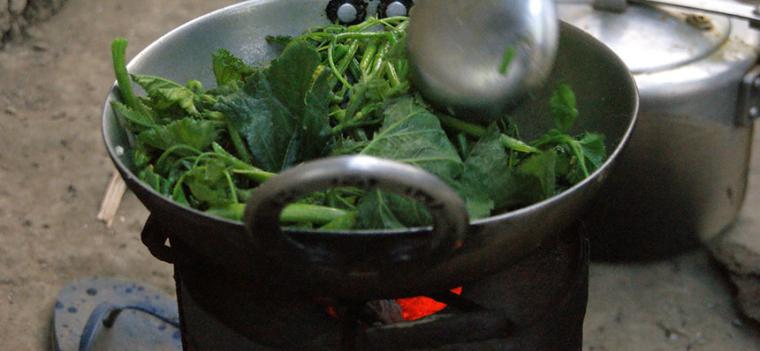News
- Three quarters of households in Nepal use inefficient cookstoves that pose significant health risks. The government of Nepal has committed to ensuring clean cooking solutions for all households by 2030.
- As part of the Efficient, Clean Cooking and Heating (ECCH) program, ESMAP is helping to determine the appropriate model for increasing the adoption of efficient, clean cookstoves to meet this goal.
- ESMAP launched ECCH, a cross-sectoral collaboration between the Energy, Environment, Health, Gender, and Climate Change teams of the World Bank and the International Finance Corporation, to support increased access to cleaner, more efficient cooking and heating.
Indoor air pollution is a critical health issue that affects many households in Nepal. Approximately 75%—or 4 million—of Nepal’s 5.43 million households cook indoors, using fuels like firewood, cattle dung, or agro-waste, in inefficient traditional cookstoves. The negative health consequences—disproportionately impacting women and children—have been well documented. The collection of these fuels is an arduous process, occupying most of the day and causing physical stress. Smoke from these stoves penetrates deep into the lungs, causing deadly and acute health effects. In Nepal approximately 8,700 people die each year from exposure to indoor air pollution.
The Government has sponsored a strategy to minimize the use of traditional cookstoves by promoting improved cooking solutions. Local stakeholders from the private sector, NGO and donor communities agreed that improvement in cooking solutions should include reduced indoor air pollution, efficient use of fuel, faster cooking time, robustness, and reparability. Ancillary factors, such as the perception of modernity, affordability, ease of operation, use of local materials and labor, and ability to perform specialized functions, such as space heating in the higher altitude regions of Nepal, were considered crucial for scaling up such a program. The Alternative Energy Promotion Centre (AEPC), the nodal agency created in 1996 for promotion of alternative and renewable energy in the country, has prioritized the dissemination of biomass-fired cookstoves and new factory produced cookstoves that function like traditional cookstoves but emit at a much lower rate, commonly referred to as improved cookstoves. The dissemination of these stoves was a critical component of AEPC’s National Rural and Renewable Energy Program. While these models may still produce some emissions, a scale-up of improved cookstoves can help lay the groundwork for even cleaner market-based solutions in the future.
Five governments (Denmark, Germany, Nepal, Norway, and the United Kingdom), two multilateral banks (the Asian Development Bank and the World Bank), two United Nations organizations (United Nations Development Programme and the United Nations Capital Development Fund), and the Netherlands Development Organization (SNV) committed US$184 million to execute the program from 2012–17. Thus far, AEPC has disseminated more than 1.3 million cookstoves and facilitated the construction of over 350,000 biogas plants throughout the country. As part of Nepal’s commitment to the Sustainable Energy for Allpartnership, the Government’s goal is to achieve Clean Cooking Solutions for All (CCS4All) .
In this context, the government requested assistance from the World Bank through the Energy Sector Management Assistance Program(ESMAP), to create an investment prospectus for achieving the CCS4All goal. The investment prospectus outlines a comprehensive strategy of market-based solutions to ensure all households in Nepal cook with improved cookstoves. It specifies scenarios during 2017-30 for each region of Nepal, depending on the type of cookstove households currently use and what kind of clean cookstove alternative should be adopted. The publication of the investment prospectus was a crucial step in solidifying support from the Government, local stakeholders, and international partners for the CCS4All goal. ESMAP is also supporting AEPC to develop business models, product selection criteria, and standards and labels for the clean cookstoves identified in the investment prospectus scenarios. The next step includes pilot activities to demonstrate a market-based approach for promoting improved cookstoves in key locations representing each ecological zone of Nepal.
The pilot activities present an opportunity for Nepal to establish a sustainable industry focused on clean cooking. With ESMAP’s support, the Government of Nepal can determine appropriate cooking and heating solutions to alleviate the adverse indoor air pollution-related health impacts borne by many households in Nepal.
Nearly three billion people worldwide use solid fuels in open fires and traditional stoves as the primary source of cooking and heating energy, causing more than three million premature deaths annually. In response, ESMAP launched the Efficient, Clean Cooking and Heating (ECCH) Program in 2015 to increase access to cleaner, more efficient solutions worldwide. ECCH serves to coordinate World Bank efforts in clean cooking and heating, and collaborates with partners both globally and at the country level. In addition to the work in Nepal, ECCH has mobilized lending in World Bank operations, such as in the China Hebei Air Pollution and Prevention Control Program; developed gender-sensitive and user-centric approaches, such as in the Indonesia Clean Stove Initiative and the Lao PDR Clean Stove Initiative; and piloted approaches to attract private sector investment through results-based financing, such as in Indonesia and Uganda.
